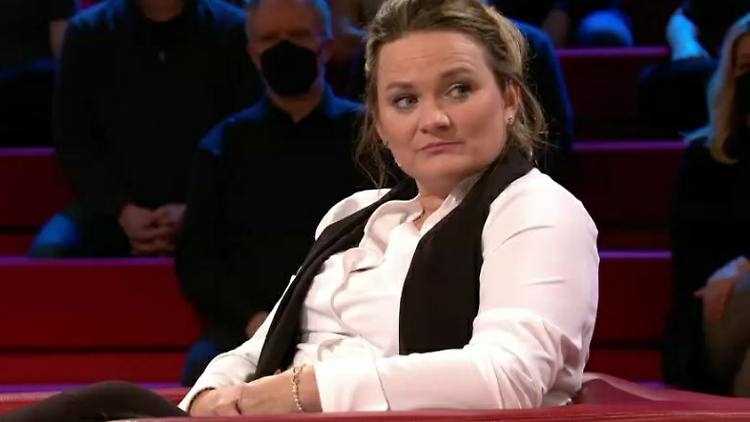A hot seat that deserves its name: For climate protector Müller, “peaceful sabotage” is a permissible means of protesting climate policy. The group at “Stern TV”, on the other hand, keeps their distance from this view.
The discussion was pretty lively, summarizes moderator Nikolaus Blome at the end. And that might have been a bit of an understatement. Blome and climate activist Tadzio Müller, his special guest in the hot seat on “Stern TV”, simply did not get together on Sunday evening. The group worked less controversially with Frauke Ludowig, TV chef Nelson Müller, actress Elena Uhlig and “Let’s Dance” juror Joachim Llambi through the topics of violence against the police and language sensitivity.
In the debate on climate protection, the fronts are quickly clarified. Climate activist Müller introduces himself with the sentence: “The climate crisis is violence, so peaceful sabotage is legitimate self-defense.” When Blomes objected that there was no such thing as “peaceful sabotage,” Müller said a cyclone on Madagascar killed six people that morning, and last year the flood in the Ahr Valley killed 134 people. That’s the violence we need to talk about.
What is “peaceful sabotage”?
Then he defines: “Peaceful sabotage are actions in which people, for example, disable coal excavators or equipment that builds a gas power plant and first and foremost take great care to ensure that no one is harmed and, if there is a possibility, that happens, the action is called off.”
Blome accuses Müller of saying to car owners: “Unfortunately, your car has to catch fire today – dear viewers, go out tomorrow, tomorrow your car will burn, it’s just for climate protection.” You can talk about climate protection, but you also have to talk about the choice of means.
In “Spiegel” Müller said last year: “Whoever prevents climate protection creates the green RAF.” When Blome asked him about it, he protested vehemently. What he actually means remains a bit unclear – but he obviously wanted to say that a “green RAF” could be the result if there is no drastic climate protection. At least that’s the impression he didn’t want to call for the founding of such a terrorist group.
There is also disagreement between Blome and Müller as to whether the peaceful protest by Fridays For Future is successful. Blome emphasizes that there is a tightening of climate protection, Müller counters that politics have no relevant effect on slowing down greenhouse gas emissions.
RTL viewers agree on the question of whether climate protection also justifies violence if necessary. More than 90 percent said no in a live survey.
Violence from overwhelmed pensioners
The state of mind is completely different when you look at the police murders in Kusel: the story “still sticks in our bones,” says Frauke Ludowig. Policewoman Cathleen Martin reports that it is now “ordinary citizens who attack the police officers”. That has shifted in the past two years since Corona. It used to be younger people who wanted to “live out their ideologies”. It is now a cross-section of the population. “There is the pensioner as a criminal who is simply overwhelmed with this whole situation, who unloads his emotions on the police and takes them out on the police.”
The motto of the police is de-escalation, says Martin, who chairs the German police union in Saxony. “After all, we’re only human. As police officers, we don’t want to hurt our counterparts either.” If a demonstration remains peaceful, “of course we’re happy as police officers.”
Martin’s 21-year-old son also wants to be a police officer. When asked how she deals with it, she says: “As a trade unionist, I say: It’s a wonderful job. As a mother, I say: I’m very afraid for my son.” When she saw the pictures from Kusel, “it ran cold down my spine”. First she had to think of the young colleagues with whom she works in training. The next thought was, “Oh god, that could be your boy.”
Cathleen Martin demands that politicians change the equipment, “that we don’t have the cheapest equipment, but the best equipment for all police officers throughout Germany”. She makes it clear that the police are also affected by savings and “always have to take the cheapest offer”. “The cheapest provider” is also used for bulletproof vests. If, as a police officer, she decides to buy her own, better vest, “I’m not officially insured with this vest if something happens.”
“No one would say the N-word”
“Stern TV” is also about Snow White and the seven dwarfs that evening – and the question of what you can actually say today. Do you have to “retrospectively go through history with the big eraser”, asks Blome provocatively. “Nobody would pronounce the N-word because it just doesn’t work,” says Ludowig. “Language has enormous power,” says TV chef Müller. The group agrees that you should always try to put yourself in the place of your conversation partner. “We have to have respect for the person or group it affects,” says “Let’s Dance” juror Llambi.
A change of perspective also means seeing the world from a different angle,” says Nelson Müller. And not from the point of view of Christopher Columbus, but from the point of view of the indigenous people who came to South America from the Aleutian Islands. “The word ‘Indians’ also created a picture of colonialism and ethnological exhibitions.”
“There are also classics that don’t discriminate”
Actress Elena Uhlig says she doesn’t use this word at all, but especially not when she reads to her children. In general, however, if a term discriminates against people, we have to do it. Researcher Tebogo Nimindé-Dundadengar says she sees “no need to read discriminatory literature to children.” With all love for classics, “there are also classics that are not discriminatory”. She would not read her “children books that reproduce stereotypes”.
The reason for the round was the Disney company’s announcement that it would not cast the seven dwarfs in the previous form in the remake of “Snow White”. The background is the indignation of the short actor Peter Dinklage from “Game of Thrones”. Disney tells “this backward-looking shit story about seven dwarfs who live in a cave”.
“There’s nothing wrong with dwarfs from fairy tales,” as long as you don’t address him that way, says actor Peter Brownbill, who is also of short stature, in the “Stern TV” round. “The dwarf is a mythical creature.” But one must deal with Peter Dinklage’s objection. Nimindé-Dundadengar sees no problem in the word alone. But: “I can understand when a short person says I don’t want to play that.”

